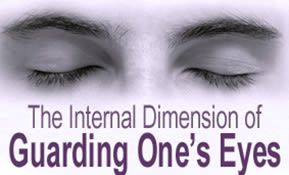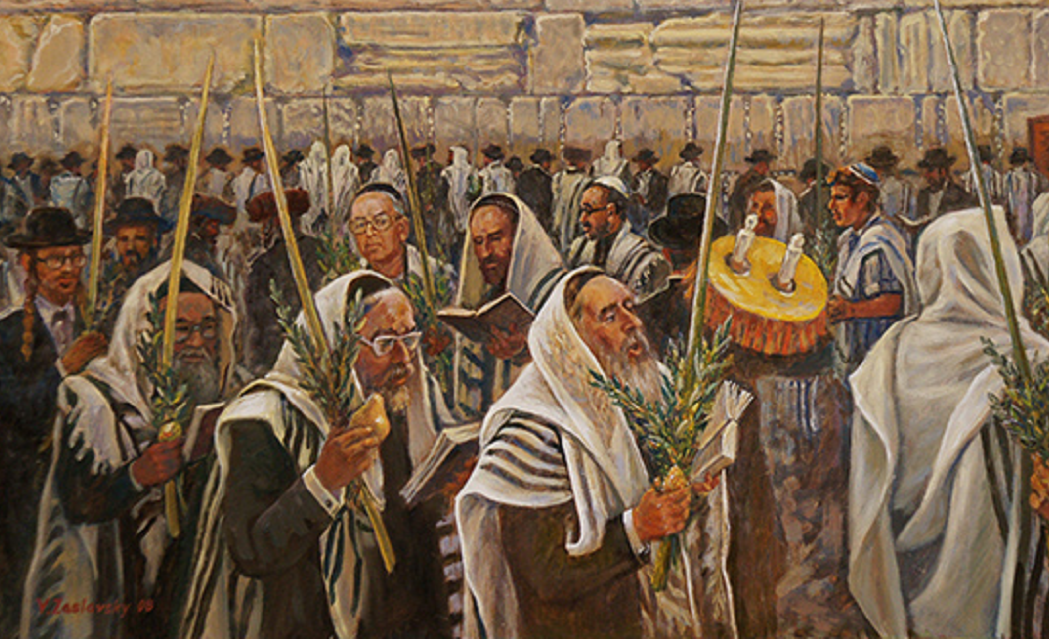
Spiritual Deep Sleep
If a person doesn't arouse himself, then nothing else will arouse him. As much as the servant tried to wake the viceroy...

A Monumental Tzaddik – and Guardian of the Eyes
Rebbe Nachman teaches (Likutei Moharan I:67), that by guarding the eyes, one sifts the good from the evil in one’s character by guarding the eyes. As long has one hasn’t separated the good from the evil, then every time he opens his eyes, evil has an influence, leading to jealousy, hate, and lust. And, when someone sees something expressly forbidden, then the evil literally overcomes his soul, controlling all the limbs of his body; this is the reason that negative emotions have such a profound influence on physical health.
Only when one sifts the good from the evil within one’s own character – strengthening the good and discarding the evil – can he open his eyes with no danger. Rebbe Nachman of Breslov reached such lofty spiritual heights that in his eyes there was no difference between a tree and a woman. Yet, he nevertheless guarded his eyes.
Other great tzaddikim who totally rid themselves of evil were extremely cautious about guarding their eyes nonetheless. The renowned tzaddik of the previous generation, Rabbi Yisrael Abu Chatzeira the beloved “Baba Sali” of blessed memory, maintained an exalted level of holiness, particularly in everything that had to do with the eyes. Now, if the great tzaddikim – who had totally rid themselves of evil – were so careful about guarding their eyes, shouldn’t we? Since our own Evil Inclinations seek to trip us every step of the way, we should certainly be careful about guarding our eyes and denying evil the power to subdue us.
Deep Sleep
And on the way he saw a tree, and on it grew very appealing apples. And they were irresistibly tantalizing to his eyes, so he approached and ate one. Right after eating the apple, he dropped and fell asleep…
Rebbe Nachman writes (Likutei Moharan I:60, which is an elaboration of our tale at hand), that there are those that fall into a deep sleep because of improper eating. Specifically, he says:
“There are those who sleep their entire lives, even though they think that they are serving Hashem, praying and learning Torah, but despite all their work, Hashem has no gratification from them, for their deeds remain below, and lack the power to ascend.
“The principle vitality is the mind, for it is written: ‘Wisdom shall revive its host,’ (Ecclesiastes, ch. 7). When a person’s service of Hashem is with the mind, it gains the vitality to ascend. But, when the mind falls into a state of constriction, tantamount to dormancy, then one cannot ascend.
“There are those who have fallen into a deep sleep by way of bodily lusts and evil deeds. There are those who are fine and upright people, but they fall because of eating. For sometimes when one eats a certain food that hasn’t properly been purified for human consumption, the brain falls into slumber. Just as from a bodily standpoint there are those foods that make a person drowsy and those foods that arouse a person, so it is in spirituality, there are foods that haven’t properly been purified on a spiritual level, that reduce a person to a state of spiritual slumber…”
And he slept a very long time. His servant would try to wake him, but to no avail…
If a person doesn’t arouse himself, then nothing else will arouse him. As much as the servant tried to wake the viceroy, he didn’t succeed. We always have free choice, and our principle free choice is that we stimulate ourselves to search for truth. Without such self-stimulation – even in the slightest – neither Torah nor rote observance of mitzvot and the influence of tzaddikim will arouse a person. Rebbe Nachman says:
“One must awaken the sleeper, and it’s impossible to arouse the sleeper until he awakens himself, for one must have stimulation from below” [self arousal, as opposed to depending on stimulation from above, or Divine arousal – LB].
Afterwards, he awoke from his sleep, and asked the servant, “Where am I in the world?”
A person wakes from spiritual slumber the minute he or she begins asking questions about life: What’s my purpose on earth? Why do I feel a gnawing deficiency in my life? Why don’t I have satisfaction and happiness? Shall I waste my life on things of no consequence? These questions arouse a person and bring him or her closer to the true purpose of life. As such, as soon as the viceroy awakens, he asks where he is in the world.
And the servant told him the story…
After the viceroy awoke, what is known in Kabbala as itaruta dilatata, or self arousal, the servant told him the “story.” Allegorically, the servant told him tales of yesteryear to help the viceroy’s reawakening. Rebbe Nachman writes (ibid), “Only when he arouses himself, can outside stimulation prevent him from further slumber.”
When a person falls into spiritual sleep, in other words, when he loses focus on his purpose in life and therefore loses his connection with emuna – then he must be aroused by tales of yesteryear. Before Rebbe Nachman would tell his tales, he’d say, “Now I shall begin to tell a tale.” His intention was that no conventional Torah lesson could wake his listeners from their spiritual slumber, only a tale. Within his tales were the loftiest esoteric secrets of Torah, for even the great Kabbalists testified that all the principles of Kabbala are alluded to in Rebbe Nachman’s tales.
To be continued.









4/09/2024
Great stuff! Thank you so much! God bless!